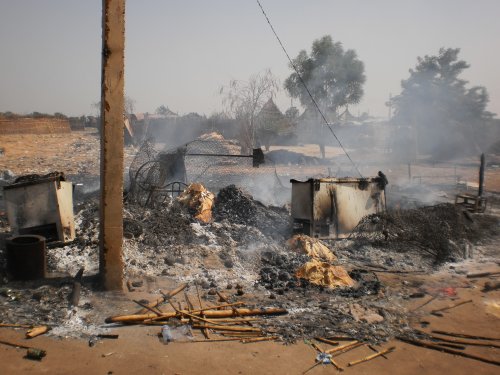UPDATES
Old Sudanese habits live on despite peace accord
April 24, 2012 | Daniel Meyerowitz-Katz

The nascent State of South Sudan was not given much of a chance. It declared independence only nine months ago — in what was hoped to be the end of a brutal, decades-long civil war. Nevertheless, the Sudanese regime seem intent on keeping the conflict going in perpetuity.
As the Sudan Tribune has been reporting, the regime in Khartoum has recently ramped-up its indiscriminate aerial bombardment of a contested border region and has been supporting ground assaults in actions likely to provoke a civil war.
A Reuters reporters at the scene, outside the oil town of Bentiu, said he saw a fighter aircraft drop two bombs near a river bridge between Bentiu and Rubkona.
“I can see market stalls burning in Rubkona in the background and the body of a small child burning,” he said.
Bombs targeting the key bridge in the town landed some 50 metres away from an Agence France Presse (AFP) reporter. In the market, stalls were on fire and large plumes of grey smoke rose high into the air, as screaming civilians ran in panic.
One charred body of a small boy was seen by an AFP reporter, while market traders said that three civilians had been killed, although those figures could not be immediately verified. …
South Sudan’s Vice president, Riek Machar, on Sunday morning warned that if the SPLA was attacked as it withdrew or if SAF launched further attacks inside South Sudanese territory they would move to retake Heglig by force and defend the 1956 borders, referring to the border as left at the end of Anglo-Egyptian rule.
The SPLA intelligence official also claimed that “militias” were involved in the assault referring to the Sudan South Liberation Army (SSLA) a rebel group in Unity State that Juba says is backed by Khartoum.
This blog has previously covered the long-standing ties between the South Sudanese and Israel. This topic has been addressed at length today by Nick Cohen in The Algemeiner. Cohen notes how Israel’s founder, David Ben-Gurion, originally had a vision for the “fringe” minorities in the Middle East — who did not fit into the Arab Muslim majority — to unite against oppression. Cohen also notes the importance of the campaign to Jews worldwide.
Hence, the bottom line is this: in a region filled to the brim with hateful enemies and fair-weather allies, South Sudan is the only state that can truly be called a friend of Israel. The origins of this friendship stretch back to the early years of the State of Israel, when David Ben Gurion, Israel’s first Prime Minister, articulated a strategy known as the “Alliance of the Periphery,” whereby the non-Arab and non-Muslim populations in the Middle East-Kurds, Iranians, Lebanese Christians and so forth-were regarded as natural partners in countering the Arab campaign against the Jewish state.
Yet showing support for South Sudan in its hour of need is not Israel’s task alone. Jewish communities in the diaspora should also be advocating for a renewed “Alliance of the Periphery.” After all, when we hear the blood-curdling declamations of Sudan’s dictator, the indicted war criminal Omar al Bashir, against the “insects” running South Sudan, how can we not be stirred by the parallels with the Iranian regime’s anti-Israel rhetoric, or the fulminations against the “sons of pigs and monkeys” across the Islamic world, or even the dehumanizing verbal assaults by the Nazis upon the Jews?
As we have previously noted, Sudanese President Omar Bashir is still yet to be brought to justice, despite being indicted for Genocide since 2008. This week’s activities are even more proof — as if it were needed — that the impunity that he is being afforded by the international community is a de facto license to continue to commit atrocities. Hopefully, this time, the world will do better.
Daniel Meyerowitz-Katz
Tags: Sudan





